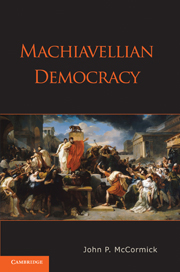Book contents
- Frontmatter
- Contents
- Preface
- Abbreviations for Machiavelli's Writings
- Introduction: Liberty, Inequality, and Popular Government
- PART I
- PART II
- 3 The Benefits and Limits of Popular Participation and Judgment
- 4 Elections, Lotteries, and Class-Specific Institutions
- 5 Political Trials and “the Free Way of Life”
- PART III
- Notes
- Acknowledgments
- Works Cited
- Index
5 - Political Trials and “the Free Way of Life”
Published online by Cambridge University Press: 05 June 2012
- Frontmatter
- Contents
- Preface
- Abbreviations for Machiavelli's Writings
- Introduction: Liberty, Inequality, and Popular Government
- PART I
- PART II
- 3 The Benefits and Limits of Popular Participation and Judgment
- 4 Elections, Lotteries, and Class-Specific Institutions
- 5 Political Trials and “the Free Way of Life”
- PART III
- Notes
- Acknowledgments
- Works Cited
- Index
Summary
Men are kept better and less ambitious longer through fear of punishment.
Machiavelli, Discourses, I.29In Rome, the people ordinarily wielded authority over the blood of fellow citizens.
Machiavelli, Discourses, I.49Freedom is the sine qua non of popular government. Political actors and political philosophers dating back as far as Pericles and Aristotle convincingly attest to this fact. Yet the freedom so prevalent in governi larghi or democracies, ancient and modern, often allows citizens with considerable material resources and the cultural capital of family and personal reputation to enjoy these advantages at the expense of less privileged citizens. Obviously, if “liberty” is to be more than an empty slogan or an ideology permitting haves to oppress have-nots, common citizens must live unmolested and unthreatened by fellow citizens of whatever rank. Such liberty is, however, notoriously difficult to achieve and maintain: ordinary citizens intimidated by the prospect of retaliation by those with greater economic, political, or social wherewithal will not readily accuse, indict, or convict abusive and self-aggrandizing members of the privileged classes. How can the common people, in addition to well-intentioned but perhaps vulnerable public officials, confidently take steps that protect genuine freedom for all citizens? Absent political institutions that allow them to do so safely and without disrupting public order, “republican liberty” signifies nothing but the freedom of wolves among lambs.
- Type
- Chapter
- Information
- Machiavellian Democracy , pp. 114 - 138Publisher: Cambridge University PressPrint publication year: 2011

